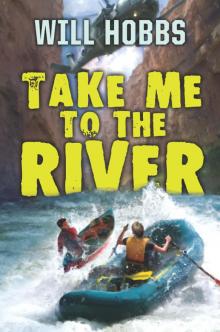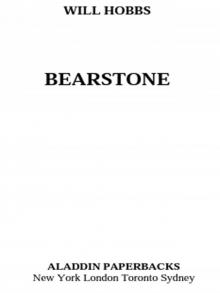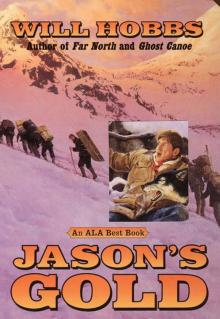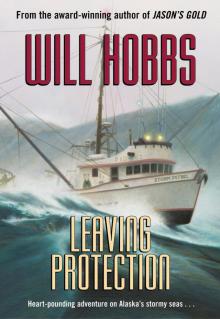- Home
- Will Hobbs
Leaving Protection Page 11
Leaving Protection Read online
Page 11
I was trembling. I had turned to jelly. Get ahold of yourself, I thought, or you’re not going to get through this.
It all felt too big. Huge. Hopeless.
I lurched to the galley sink and threw up. It wasn’t seasickness, it was stark terror.
“Quitter!” Torsen screamed. “Just like I thought, you’re nothing but a quitter!”
I heaved some more, wiped my face with a dishrag, and held on tight, or I would have been thrown to the floor. How much punishment could the boat take?
“Engine’s overheating—get down there now!”
He was right, it had to be done. I waded through the clutter on the floor, spun, and went down the ladder.
It was raining from the engine room ceiling, the motor hissing with every drop. The bilge bump was loud and sucking full bore, but couldn’t keep up. The floor was ankle-deep in water. Bracing as best I could, afraid I’d be thrown onto steaming hot metal, I sloshed around trying to figure out what was wrong.
It was easy enough to see that the auxiliary generator for the lights had broken loose from its mounts, which would explain the crash we’d heard, but not the engine overheating.
My mind shut down as it hit me: if we capsize while I’m down here, I’m dead for sure.
My stomach was cramping again. This time I fought it off and battled to get myself under control. Suddenly I saw it—the auxiliary generator had fallen onto a cooling hose. The hose had been nearly pinched shut.
I got down on one knee and lifted the generator off the engine, then made sure the hose hadn’t stayed pinched flat. It was back in working order, circulating water and coolant.
Lurching around, I found a piece of rope and secured the auxiliary generator so it couldn’t fly around and damage wiring, cooling hoses, carburation, any vital system. If the engine went down, we had no chance.
Something was strange about the exhaust stack. It had turned from black to white with all the salt water running down it. Thank goodness our leaks were above the hull. Thank goodness the hull was fiberglass, not old wooden planks like the hull of the Chimes.
Topside, I discovered that Torsen had somehow turned us around and back into the wind. My eyes went to the temperature gauge. It was nearly back to normal. “Seawater’s forcing its way through the exhaust stack’s roof jack,” I reported.
Torsen waved my news off like it was nothing. “We lost the hatch.”
“What hatch?”
“The hatch over the fish hold. That hundred pound fiberglass cover, gone with the wind. I saw it blow away.”
This was sickening news. The belly of the boat was open to the sea. “Is the hold’s bilge pump working?” I shouted above the whine of the wind.
“It’s working, but the radio’s not.”
“Why not?”
“The antenna broke clean off.”
“We can’t call Mayday?”
“That’s right, we can’t. Tell me, do we have anything we can lash the plaques to? What do we have that floats?”
“The little skiff and the life raft up top, but we can’t get to them.”
“Skiff’s gone—I saw it fly. You didn’t tie it down very good.”
“Thanks for sharing,” I said.
He ignored me. “I don’t want the plaques loose. Think, what do we have that we can attach them to?”
“You think we’re going to capsize?”
“I didn’t say that. I need you to take care of those plaques. Do it, and do it now!”
This was too much. “Why should I help you save them?” I hollered.
“Don’t you understand how important those are? They can’t be lost!”
“You don’t understand! You’re just going to sell them anyway, I know you are. They’ll be lost either way. They should be in a museum and you know it!”
“Quit arguing and help me!”
“I have an idea,” I shouted. I balanced my way out the back door to the deck. The hatch cover was gone, but the plywood tray still spanned the opening. In a gully between waves, I grabbed one of the plastic milk crates, the one I’d used for stashing the big glass fishing float for my sister. The glass ball had been a snug fit, and was still inside.
I had to wait out a big pitch and roll before I made my move for the wheelhouse. Once inside, I took the glass ball out and placed the plaques on the bottom of the crate, one atop the other. Then I put the float back inside. To keep the ball from floating out of the crate, all I needed was rope. There was a coil in the closet behind me.
Tying to one of the built-in handles on the crate, I lashed the rope over the top of the ball and back and forth and every which way through the plastic ribbing until only glimpses of the green glass could be seen among the lashings. I tied off to the opposite handle with a slew of half hitches. “Done,” I called out.
“Good,” Torsen replied. “Here comes another big one. Hang on!”
I braced for all I was worth, and even so, was nearly thrown onto the stove. The Petrel heeled over so far she was on her side. Out the side window, I saw the port trolling pole disappear underwater. I thought for sure the whole boat would follow.
Miraculously, the Petrel righted herself, but something was wrong outside. One heavy thud was followed by another. “Did it break?” Torsen called. “Did the pole break off?”
I craned my neck to see. “No, the pole flew up against the mast. But it’s not in its bracket.”
“The port stabilizer! What happened to the stabilizer?”
“It must be up against the hull.”
“It’ll punch a hole in it.”
“Why didn’t you pull them this morning?” I yelled. “We could’ve gone faster.”
“For stability, fool! I didn’t know it would get this bad. We have to pull ’em now. The one against the hull, you should be able to reach out and cut its rope.”
“You gotta be kidding, Tor. You go out there.”
“My back won’t let me, or I would. Listen, kid, you have to tighten the stays on that port pole so the pole stays upright. If it flops back down, its rigging is going to end up in the prop or the rudder, and then we’re done. The starboard pole, you gotta pull it vertical and cut its stabilizer loose.”
This was it. This was the opportunity he’d been waiting for. I could read it behind his eyes, cold as the eyes on the octopus, years before, that had tried to drag me into the sea. “Dream on,” I yelled at him. “You go out there!”
“Fine, we’ll go down together. That stabilizer is like a spear point, you know it and I know it. The hull’s an inch and a half thick. You give that some thought.”
“Not without a survival suit.”
“Go get the suits, then.”
“There’s only one, remember?”
“Go get it!” he thundered.
I went below and came back with it. I kicked my boots off and began to pull on the one-piece suit. It had a nylon shell that was lined with closed-cell foam to float you and buffer you from the freezing seawater. I zippered it shut and adjusted the neoprene cuffs, then pulled my boots back on. I put on rubber gloves, grabbed a sharp knife from a galley drawer, and sloshed my way to the half-door, which I fastened open. I jammed my body in the doorframe, awed by the mountainous, wind-driven seas all around the back of the boat. How was I going to do what had to be done and stay on board?
The immediate problem was crossing to the port rail without being thrown into the yawning hatch, where salmon that had spilled over the tops of the side bins littered the central floor.
With an eye on the waves, I timed my move, keeping tight against the back of the wheelhouse. It didn’t take long to snake my way around the corner to the base of the port pole. I wrapped my legs around it, reached out with the knife to cut the stabilizer rope, and nearly went over when the boat pitched suddenly in the direction I was leaning. But I managed to hang on, and then I sawed the rope in two. The stabilizer was on its way to the bottom of the Pacific.
Just then a wave slammed the Petrel from t
he opposite side, and the port pole fell from vertical back to its fishing position. I was going to have to haul it up by hand.
Which I did, all the while barely hanging on. The wind lashed like a whip, the waves poured over the side of the boat, and salt water stung like fire in my eyes. At last I had the port pole upright and its rigging so tight and double-knotted, it couldn’t go anywhere. I grabbed the knife, which I had stuck in the side of the wheelhouse, then crabbed my way around the back to the starboard side.
In the time it had taken me to get the port side taken care of, the starboard pole had bent like a straw. The stays and the rigging were a tangled mess. I heaved on the line with all my might, but nothing gave. With the boat pitching every which way, I got back into the wheelhouse and told Torsen where we stood.
“Go back and try again,” he ordered.
“What do I do different?” I asked in total frustration.
“Pull harder!”
“Look, I pulled as hard as I could. Just leave it be.”
“You don’t know what it’ll do to us. Here, get behind the wheel, I’ll do it myself. When in doubt, give it throttle.”
“Take the suit, Tor. Here, I’ll take it off.”
He ignored me, just took the knife and pushed past.
There was nothing to do but grab hold of the wheel spokes, fight for control of the rudder, push on the throttle, and face the waves. A glance over my shoulder confirmed that Torsen was already outside. I remembered to monitor our direction of travel on the GPS. Unless we stayed on course for Lituya Bay and got there in time, there was no way out of this for either of us.
This was a nightmare, a never-ending ride on a crazed whale. I prayed I wouldn’t have to face a wave like the one that crashed down on the wheelhouse.
I had no vision of the spot where Torsen was working. At last, over my shoulder, I caught a glimpse of the starboard pole cranking up against the mast. Somehow Torsen had jerked it loose. Now he just had to finish—tie it off and cut the stabilizer free.
The wind began to shriek louder than ever. Here came a wave as big as any we’d seen. I pointed the bow straight into it and leaned hard on the throttle. The wave was so tall, it looked like we might not be able to climb it. I had the sickening feeling we were slipping back. If we did, we would broach, swamp, and capsize.
We barely made it over the top, but as we cleared the crest, the prop lost its bite. This time we slipped sideways. When the prop caught again, it was all I could do in the face of yet another giant wave to crank furiously on the wheel, come about, and run with the wind.
I was running with that wave, on its very crest, and looking down into an abyss. The bottom of the trough seemed a hundred feet below. When in doubt, Torsen had said, give it throttle. That’s what I did, I slammed the throttle forward. In a heartbeat we would hit bottom, and when we did, we had to be in control, or we’d be tossed around like a toy.
It was a rough landing. At the bottom of the trough, the Petrel yawed badly, then broached immediately to windward. I was thrown out of my seat. My head cracked against something. I thought for sure we had capsized.
Amazingly, as I struggled to my feet, the Storm Petrel was righting herself. One of our poles—the starboard pole—was in the water. It had broken clean off before Tor could secure it.
There was something else in the water, amid the heaving gray seas: the bearded face and upraised hand of Torsen. He’d been swept overboard.
19
I PULLED BACK ON THE throttle and took the boat out of gear. I ran to the deck, hung on tight, and tried to spot Tor. He was on a rising wave a hundred feet away, floundering in the surf, trying to swim.
There had to be something I could throw him, and fast. There wasn’t a life ring, like on the Chimes. What, what else was there? All I could think of was the milk crate with the glass float. I grabbed it from the closet. This was going to be a crying shame, throwing the plaques into the sea.
For a second I hesitated. Wasn’t he exactly where he had wanted me to be?
Torsen was still struggling to stay on the surface. I got his attention, then heaved the crate as far as I could.
I waited, the Petrel getting slammed, as Torsen swam after it, up and down the slopes of the waves. He struggled, until at last he had hold of the crate. It was buoyant enough to give him some relief, but by this time he was well behind the boat and nearly out of sight.
I ran back inside and got the Petrel turned around. By the time the bow was pointing to the area where I guessed he was, Torsen was nowhere to be seen. What now?
I just had to make my best guess and hope I was right.
There he was, to starboard, arms encircling the rope-wrapped fishing float. I steered in his direction, wondering how I was going to get him aboard. A ninety-pound salmon had nearly been too much for me.
I brought the Petrel close, then took it out of gear again. The boat tossed every which way. I raced to the deck, hoping I could get to him before a crashing wave got to the boat.
“Over here, over here!” came Torsen’s voice, this time from the port side.
I crabbed across to his side of the boat, desperate to avoid being pitched over myself. I got down on hands and knees and went to the rail. Tor had the crate clutched tightly to his chest.
“Get closer,” I screamed. “Give me your hand!”
He sidestroked closer, a wild look in his eye. “Won’t work!” he yelled. “Get a gaff hook! I’ll grab it!”
One eye on the spilling seas, I scrambled for a gaff, then shimmied back on my belly.
Torsen was trying his best to stay close to the boat as his strength drained. He was blue in the face. I reached as far as I could with the gaff hook; he kicked and was able to grab it with his right hand.
“On the count of three,” I heard him yell. “I’ll kick, you pull.”
I rose as I counted “One—two—three!” I pulled with all my strength.
I heard him kick. I heard him grunt. He managed to get one hand up on the bulwark, but it was futile. The wave dropped out from under him, and he was swept away.
The crate with the glass ball was swept away with him. Torsen appeared to glimpse it, and swam after it. Then he must have lost sight of it; I couldn’t see it either. Tor gave up on it, turned, and swam back to the Petrel. “Use a rising wave,” he cried over the shriek of the storm. “Gaff me in the shoulder blade!”
It was almost too horrible to imagine, but maybe he was right and it was his only chance of getting back on board.
The seas were building again toward another crescendo of fury, and Torsen was forced under. Just when I was sure he was gone, he reappeared farther away, and struggled once more toward my side of the boat.
Here he came, arm over arm, and here came the rising wave he wanted. I watched the seas closely, spotted my chance, and stood up full height. I leaned over and gaffed Tor behind his shoulder, sticking the hook deep. All in the same motion, I pulled as hard as I possibly could, both hands on the gaff handle, and threw myself backward. Torsen, kicking and floundering like a big yellowfin tuna, teetered close to the balance point on the bulwark. He was nearly halfway into the boat. Just then, the wave fell out from underneath him. The boat rocked in his direction, and I felt myself flying toward him and the swallowing sea.
“Let go!” he screamed. I did, and not a moment too soon. Torsen fell, as if down a mountain slope, into a yawning gulf, and went under.
It was Tor’s warning and the sudden recoil of the Petrel that saved me from going in with him. At the point of no return, gravity swung in my favor, and I was able to stop my momentum.
My last glimpse of Tor Torsen saw him giving up the fight, slipping under the waves. His precious Russian plaques were nowhere to be seen. The troller took another heavy hit, and suddenly I was flying backward, with nothing to break my fall, into a void that turned out to be the fish hold. I would have broken my neck if I hadn’t landed on the salmon that had spilled over the bin boards.
I climb
ed out and clawed my way into the wheelhouse. The Petrel was a cork in a maelstrom. It was only by a combination of superior boat design and luck that the Petrel hadn’t capsized. It might yet, that was all too obvious. As I lurched toward the captain’s chair behind the wheel, a tremendous wave broke on the bow and blew out the forward window to my left in an explosion of glass and water. I was thrown to the floor. A torrent of water poured down on me, and the wind was howling.
I got up, climbed into the seat, and reached for the controls. I put the boat in gear and opened up the throttle, then hung on to the spokes of the wheel with all my might.
More throttle, I needed more throttle. The rudder responded, and I was able to point the bow into the weather and regain something like control.
I searched for Tor as long as I dared, knowing I had to race the clock to Lituya Bay. Why didn’t you put on the survival suit, I kept asking.
A sudden lull in the storm seemed like a screaming signal that I better break and run for it. I got back on the GPS course for Lituya, pushing the Petrel toward land at full throttle.
The seas were rough, but nothing like they had been. For a good long while, I was able to average seven knots. The sky, however, was turning terribly dark to the southeast again. I had to gain every inch I could, and sneak into the bay before the next arm of the storm arrived in full force. I couldn’t see the coast but I knew I had to be near. Nine miles, said the GPS, with ninety minutes to get there before high tide ended at 2:30.
Two miles off the bay, at two o’clock, the new storm front struck. I had to steer manually; the autopilot couldn’t respond fast enough. Seas fell on the troller like avalanches. The wind gauge was reading a steady ninety, with gusts over a hundred knots. Another window broke under the barrage. More wind and water rushed in. I had the panicky feeling I’d be swimming real soon.
The wheelhouse was in shambles. The electronics were still working, the satellite still tracking my position relative to the mouth of the bay. I kept watching the map on the monitor. I had to keep my direction of travel arrow pointed at the mouth of the bay, or I’d never get there. If we capsize, take a deep breath while there’s time. Remember where the door is. Get out fast, and swim free, and get to the surface.

 City of Gold
City of Gold Kokopelli's Flute
Kokopelli's Flute Take Me to the River
Take Me to the River Jackie's Wild Seattle
Jackie's Wild Seattle The Maze
The Maze Ghost Canoe
Ghost Canoe Never Say Die
Never Say Die Down the Yukon
Down the Yukon Bearstone
Bearstone Beardance
Beardance Jason's Gold
Jason's Gold Far North
Far North The Big Wander
The Big Wander River Thunder
River Thunder Downriver
Downriver Go Big or Go Home
Go Big or Go Home Leaving Protection
Leaving Protection Wild Man Island
Wild Man Island